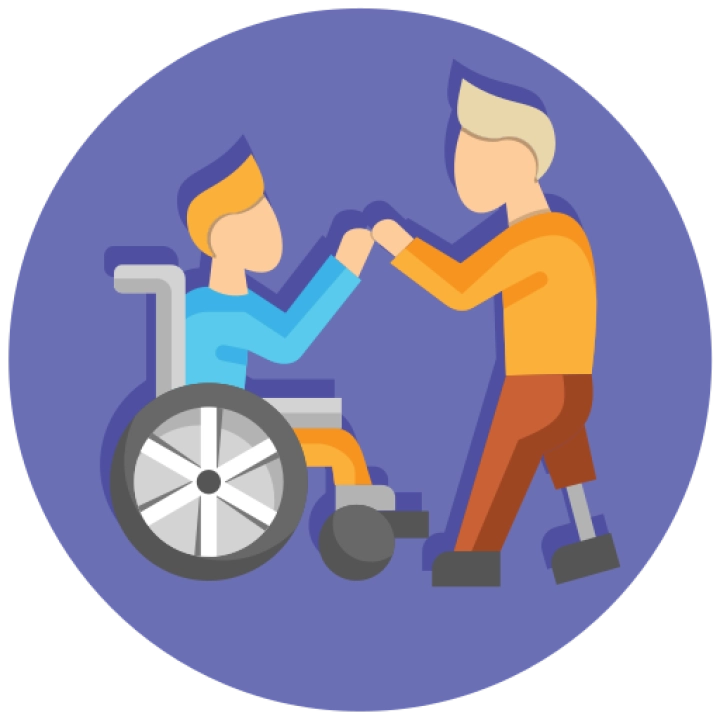College: Health Sciences
This specialization prepares students for careers in care and rehabilitation of individuals with disabilities. Students develop practical skills and theoretical knowledge in disability studies, rehabilitation techniques, assistive technologies, and inclusive practices. Graduates are equipped for roles in rehabilitation centers, special education environments, community support services, and healthcare facilities.
Learning Objectives:
- Understand the basics of disability studies, rehabilitation, and inclusive practices.
- Develop skills in assessing and addressing the needs of individuals with disabilities.
- Learn techniques for implementing rehabilitation plans, using assistive technologies, and enhancing independence.
- Explore principles of advocacy, policy, and ethical considerations in disability care.
- Analyze challenges and opportunities in caring for and rehabilitating individuals with disabilities.
- Develop critical thinking, problem-solving, and communication skills for effective disability care and rehabilitation.
Main Syllabus:
- Introduction to Disability Studies
- Overview of core concepts and industry trends in disability studies and rehabilitation.
- Basics of types of disabilities, their causes, and their impact on individuals and society.
- Evaluation and Planning in Rehabilitation
- Principles of assessing the needs of individuals with disabilities.
- Techniques for developing and implementing rehabilitation plans.
- Rehabilitation Techniques
- Basics of different rehabilitation techniques and therapies.
- Techniques for physical, occupational, and speech therapy interventions.
- Assistive Technologies
- Principles and applications of assistive technologies in rehabilitation.
- Techniques for selecting, using, and maintaining assistive devices and technologies.
- Inclusive Practices in Education
- Basics of inclusive practices in education, employment, and community.
- Techniques to enhance inclusion, accessibility, and participation for individuals with disabilities.
- Advocacy and Policy in Disability Care
- Principles of advocacy, policy development, and legal rights in disability care.
- Techniques for advocating for the rights and needs of individuals with disabilities.
- Ethical Considerations in Disability Care
- Understanding of ethical considerations, professional conduct, and decision-making in disability care.
- Techniques to ensure ethical practices and respect for individuals with disabilities.
- Practical Training in Disability Care and Rehabilitation
- Real-world experiences in disability care and rehabilitation, including observations, internships, and practical projects in rehabilitation centers, special education environments, or community support services.
- Application of acquired skills in practical disability care and rehabilitation scenarios.
- Capstone Project in Disability Care and Rehabilitation
- A comprehensive project applying skills in rehabilitation planning, assistive technologies, or inclusive practices.
- Presentation of a refined project or case study in disability care and rehabilitation.
Assessment Methods:
- Rehabilitation plans, assistive technology reports, inclusive practice studies, advocacy projects, ethical practice analyses, practical training reports, capstone projects, group projects, and internship evaluations.
Recommended Textbooks:
- "Disability Studies: An Introduction" by Lennard J. Davis.
- "Rehabilitation Counseling: Basics and Beyond" by Marcia J. Scherer.
- "Assistive Technologies: Principles and Practice" by various authors.
- "Inclusive Education: A Practical Guide for Schools" by various authors.
- "Advocacy and Policy in Disability Care" by various authors.
- "Ethical Considerations in Disability Care" by various authors.
Prerequisites:
Basic knowledge of disability studies, rehabilitation, and human services. Suitable for students interested in disability care, rehabilitation, and inclusive practices.
Duration of Specialization:
The study duration for a Bachelor's degree is typically 4 years, including coursework, projects, practical training, and internships.
Certification:
Graduates can earn a certification in disability care and rehabilitation and pursue professional certifications like Certified Rehabilitation Counselor (CRC) or related fields.
Target Audience:
Aspiring rehabilitation specialists, special educators, disability advocates, and individuals seeking to work in rehabilitation centers, special education environments, community support services, and healthcare facilities. This specialization provides students with the practical, theoretical, and advocacy skills necessary to excel in disability care and rehabilitation, supporting careers in rehabilitation, special education, and related fields.

